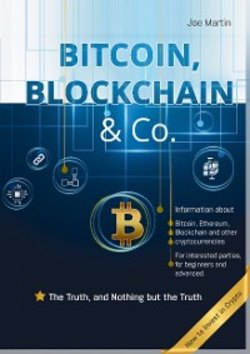Читать книгу Bitcoin, Blockchain & Co. - Joe Martin - Страница 11
Data that we can trust blindly?
ОглавлениеIf we could blindly trust data, it would have enormous consequences and that would completely change our future. Without overstating it, you could argue that it’s a fourth industrial revolution—that of the trusting society.
By this, I mean a society in which you can blindly trust any offer or transaction, even if it comes from a completely unknown third party. In this version of society, you can purchase real estate by mobile phone without a lawyer. You can have your medical files with you and any doctor, wherever you are, can rely 100% on the information contained in those files, meaning they treat you more quickly, effectively, and safely than ever before. That is the kind of life-changing impact trustable data can have.
In the following section, I will show you exactly how that works and what technical developments would need to be in place to ensure that data is always reliable and reflects the truth—without exception. I will illustrate how this system is constructed and why it is uniquely positioned to deliver the truth. Along the way, you will also discover the circumstances under which it is vulnerable to attack or could be manipulated. All of this is presented in a straightforward way, so that anyone can understand it without needing to be a software programmer.
In this book, I have drawn examples from private and professional areas in which confidential applications, dominated by the truth, deliver benefits, and how these new applications will influence the future. By the end of the book, you will fully understand why this will happen and why the development is inevitable and unstoppable. The toothpaste is just not going back in the tube!
What is the secret of such a trustworthy application, in which the truth and nothing but the truth is recorded?
If the problem is that of truth, the integrity of data, or centrality, it logically follows that the solution can only lie in a decentralized application. I’m sure this was also the exact logical progression that Nakamoto’s thoughts took when he began creating a solution.
Nakamoto built a truly decentralized application with Bitcoin—one in which data are kept simultaneously on several decentralized computers. This network of individual computers, also called nodes, always optimizes itself so that failures of individual nodes are automatically balanced. As a result, most nodes always have access to the truth. In this way, such a network is designed to safeguard against failure.
In addition, the data must always have a certain structure and be stored in a certain way so that subsequent alterations and manipulations are impossible. Through skillful linking of the individual data sets into a series of data blocks that are linked to each other, an unalterable record is produced, one which always corresponds to the unaltered truth.
The data must be stored unalterably forever, impervious to manipulation or censoring, and must be stored on many computers (nodes), completely independent of each other simultaneously. They must also, though, be linked with each other so that subsequent alteration by an unauthorized individual is denied and ignored by the majority of the computers.
House owners can relate: if the land registry has been tampered with, someone else will then suddenly own their property. That is an entirely plausible scenario that could occur through the malicious collaboration of a lawyer with an employee of the land registry or the escrow company, for example. However, this kind of manipulation would no longer be possible if the transfer of title had been registered and certified simultaneously in the first instance by many hundreds of independent places. That would mean that hundreds of lawyers and land registry officers would have to have collaborated on the deception. That is practically impossible.
